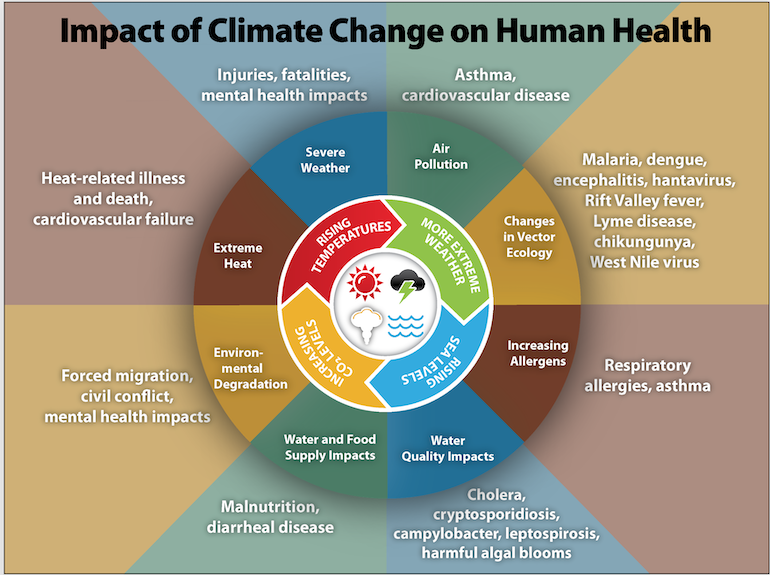
Chart provided by the Centers for Disease Control and Prevention (bit.ly/CDCclimate)
Even though the governor of Massachusetts has declared a state of emergency, things look normal enough in my neighborhood midway between Boston College and Fenway Park: People hustling down Harvard Street to catch the T, others ducking into the post office on Beacon Street.
Peek just beneath the surface, though, and it's clear that the coronavirus has rendered the times we're living in to be no longer normal. In Trader Joe’s, the lines are longer and the shelves emptier than I've ever seen either. Next month's Boston Marathon, which bisects our Coolidge Corner community at Mile 24, has been postponed for the first time in its 124-year history. The usual parade of kids to school beneath the window where I'm typing this didn’t happen this morning. Brookline schools are closed for at least the next couple of weeks.
My wife and I are grateful that we're healthy, but yesterday we called off a long planned home exchange in Ireland. As "older Americans" considered at risk for getting and spreading the virus, we’re beginning to embrace an idea we’d never even heard of until recently: "social distancing." As a result, even before Cardinal O'Malley just now called off all masses, we hadn't planned on hopping on the T to get to Mass downtown at the Paulist Center on Sunday.
Even these modest encounters with coronavirus are providing a glimpse of how the climate crisis will almost certainly change daily life -- and how important it is to take disruptive steps today to ease the crisis tomorrow.
As daunting as coronavirus has become, there's at least the prospect of brighter days on the other side. That's not necessarily so with the climate crisis.
If nothing else, our current turmoil makes the case that we really can take sweeping, difficult action as a community to address a lethal threat. Perhaps that will help make the case for the sweeping and difficult disruptions required by the climate crisis.
Fr. Tom Reese does not address environmental issues explicitly in his column about coronavirus this week, but the alignment he proposes between our "civic duty" and our Catholic faith rings as true for the climate crisis as it does the pandemic.
In both cases, our moral obligation extends far beyond our own well-being to the importance of considering the impact of our actions on everyone else. Since Ireland was excluded from the countries listed in President Trump’s travel ban, for example, Carol and I might very well have completed our home exchange in good health. But what about people we might infect on either side of the Atlantic should we become unknowing carriers?
As real as it is, the climate crisis does not stare us in the face anywhere nearly as vividly as the virus. If we were serious about reducing our carbon footprint, it shouldn't have taken a communicable disease to remind of us of the human cost of international travel.
The most interesting climate-related news I read this week zeros in on lessons that our coronavirus experience holds for the climate crisis:
- In Forbes, Joan Michelson lists six lessons for climate change from the coronavirus, and cites government research (see the chart above) detailing the impact of climate change on human health. She argues that the current crisis "reminds us that we need to proactively put in place the systems to manage the next such public health crisis, it's just a matter of when."
- Looking at the relationship from the opposite perspective, Somini Sengupta, climate correspondent for The New York Times, draws lessons for addressing the coronavirus situation from the climate crisis. She points out that the World Health Organization cited "alarming levels of inaction" to characterize the global response to the virus, adding: "It is a familiar refrain to anyone who works on climate change, and it is why global efforts to slow down warming offer a cautionary tale for the effort to slow down the pandemic."
- In The New Republic, Kate Aronoff focuses on the benefits of a four-day work week for both crises — climate as well as coronavirus.
- In his Climate Crisis newsletter in The New Yorker, Bill McKibben points to a range of new patterns we're getting comfortable with as a result of coronavirus — staying off cruise ships and working remotely, among them.
Here's some of what's new on EarthBeat this week:
- Reporting from Annapolis, staff writer Jesse Remedios goes behind the scenes with Maryland Catholics lobbying the state house on behalf of climate legislation.
- In Thursday's Lenten Daily Food Reflection, contributor Brenna Davis proposes "eating simply so that others may simply live," linking to a New York Times report detailing the sort of reduction in red meat consumption that will be required to ease climate change.
- Pegged to national Catholic Sisters Week, Patricia Montemurri reports that the Monroe IHMs are still going strong and teaching green — after 175 years.
- In her Small Earth Story, contributor Marie Steinitz describes how a switch from paper to cloth has left a ten year-old stack of paper napkins still in her basement — and out of the landfill.
Closing beat:
Thanks to all of you who responded to my request for advice about the EarthBeat Events Calendar. You gave us some good ideas, and we'll follow up as quickly as possible.
Interestingly, the coronavirus situation has resulted in the postponement or cancelation of many of the events listed on our calendar (I'll be spending some time this weekend updating those listings).
If you're reading this as an article on EarthBeat (as opposed to the newsletter), you can sign up for email delivery here. And we hope you’ll forward this week’s newsletter to anyone you believe might want to subscribe. They can do so here.
Thanks for reading!
Bill Mitchell
NCR Climate Editor
bmitchell@ncronline.org
Advertisement







